|
The Greatest Tearjerkers of All-Time
|
|
Title Screen
|
Movie Title/Year and Brief Tearjerker Scene Description
|
Screenshots
|
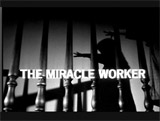
|
The Miracle Worker (1962)
- the climactic, triumphant
water-pump scene in which blind and deaf Helen Keller (Patty Duke)
learned to use sign language, and first spoke "wah - wah"
with the assistance of her teacher Annie Sullivan (Anne Bancroft),
associating sounds with objects: (Annie: "All right. Pump. No,
she's not here. Pump. W-A-T-E-R. Water. It has a name. W-A-T..."
Helen: "Wah... wah. Wah... wah." Annie: "Yes. Yes. Yes. Oh, my
dear. Ground. Yes! Pump. Yes. Tree. Step. Mrs. Keller. Mrs. Keller!
Bell. Mrs. Keller! Mrs. Keller. Mrs. Keller. Mother. Papa. She
knows! Teacher. Teacher.
Teacher.")

|
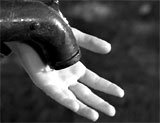
|
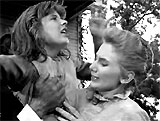
|
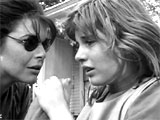
|
|
Helen: "Wah... wah. Wah...
wah."
|
|

Water-Pump Scene
|

|
Mister Magoo's Christmas Carol
(1962) (TV)
- the surprisingly tearjerking
song
"All Alone in the World" sung by young Scrooge (voice of
Marie Matthews), who was "all alone, nobody wants him, poor
lad" during
Christmas vacation at his boarding school after everyone else had
left. The song was about loneliness and not fitting in or belonging
- he traced his hand on a blackboard - hoping to find a hand to join
with his: ("When you're all alone in the world...A hand for
each hand was planned for the world, Why don't my fingers reach?
Millions of grains of sand in the world, why such a lonely beach?")
- the
young lad was joined (in duet) by an unseen adult Ebenezer Scrooge
(voice of Jim Backus) who was taken back by the Ghost of Christmas
Past to view his lonely childhood - he put his arm on the shoulder
of the young lad as their voices mingled
|
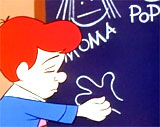
Lonely Young Scrooge Tracing a Hand on a Blackboard
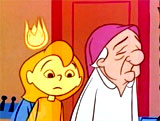
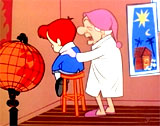
Ebenezer Scrooge Taken to View His Past
|
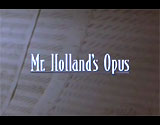
|
Mr. Holland's Opus (1995)
 #71 #71
- the scene in which Portland, OR music teacher Mr.
Glenn Holland's (Richard Dreyfuss) wife Iris (Glenne Headly) realized
that their toddler son Coltrane (or "Cole") had hearing difficulties
(he was born with 90% hearing loss, not diagnosed at first) - when
he didn't wake up and react to a loud fire engine siren; later
that day, she spoke to her husband and shared the devastating news:
("There's
something wrong with Cole.... I don't know. I've tried different
things. Uhm, sneaking up behind him and banging pots and screaming
his name and stomping on the floor. He turned when I did that -
big smile. He thought I was playing a game.... I don't think he
can hear"); Glenn started to try to call out to his son ("Cole?
Cole?!"), with no response
- the later concert scene
in which Mr. Holland, in front of an audience, sang and signed (in
ASL) John Lennon's "Beautiful
Boy" to
long-haired 15 year-old son Cole (Joseph Anderson), replacing "Boy"
with "Cole" at the end ("Beautiful, beautiful, beautiful,
beautiful...Cole")
- the final inspirational scene - a surprise gathering
on Holland's last day at work, in which a tribute speech was given
to now-retiring music teacher Mr. Holland, sitting in the
audience, delivered by the governor and John F. Kennedy HS alumnus
Gertrude Lang (Joanna Gleason), honoring him for 30 years as an
inspiring teacher: ("Mr.
Holland had a profound influence on my life - on a lot of lives
I know. And yet I get the feeling that he considers a great part
of his own life misspent. Rumor had it he was always working on
this symphony of his, and this was gonna make him famous, rich
- probably both. But Mr. Holland isn't rich, and he isn't famous.
At least, not outside of our little town. So it might be easy for
him to think himself a failure. And he would be wrong. Because
I think he's achieved a success far beyond riches and fame. Look
around you. There is not a life in this room that you have not
touched. And each one of us is a better person because of you.
We are your symphony, Mr. Holland. We are the melodies and the
notes of your opus, and we are the music of your life")
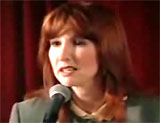
|
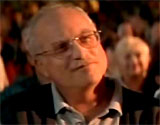
|
|
Tribute Speech to Retired Mr. Holland by Gertrude
Lang
|
- the concluding tribute to Holland
was the first performance ever of his "opus" - An American
Symphony by
his former students (including Gertrude), with Holland directing
with a baton
|
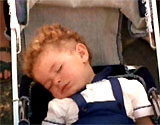
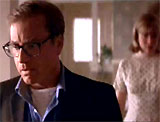
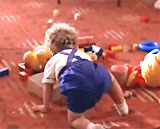
Toddler Cole's Hearing Loss Discovered
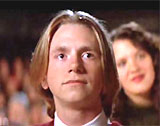
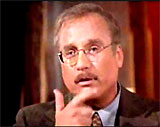
Using Sign Language To Sing: "Beautiful Boy" To Son
Cole
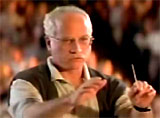
Holland's 'Opus' Directed by Holland Himself
|
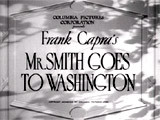
|
Mr.
Smith Goes to Washington (1939)
- the scene of betrayed idealist Senator Jefferson
Smith's (James Stewart) late-night visit to the Lincoln Memorial
when he felt downtrodden and was ready to leave town: ("This
is a whole new world to me. What are you gonna believe in? And
a man like Paine, Senator Joseph Paine gets up and swears that
I've been robbin' kids of nickels and dimes - a man I've admired
and worshipped all my life. I don't know. There are a lot of fancy
words around this town. Some of them are carved in stone. Some
of 'em, I guess the Taylors and Paines have put 'em up there so
suckers like me can read 'em. Then when you find out what men actually
do - well, I'm gettin' out of this town so fast and away from all
the words and the monuments and the whole rotten show")
- Smith's
secretary Clarissa Saunders (Jean Arthur) encouraged him to remain,
go against the odds, and tell the truth: ("You
can't quit now. Not you! They aren't all Taylors and Paines in
Washington. Their kind just throw big shadows, that's all. You
didn't just have faith in Paine or any other living man. You had
faith in something bigger than that. You had plain, decent, every
day, common rightness. And this country could use some of that.
Yeah - so could the whole cock-eyed world. A lot of it. Remember
the first day you got here? Remember what you said about Mr. Lincoln?
You said he was sitting up there waiting for someone to come along.
You were right! He was waiting for a man who could see his job
and sail into it. That's what he was waiting for. A man who could
tear into the Taylors and root 'em out into the open. I think he
was waiting for you Jeff. He knows you can do it. So do I")
- the classic, climactic scene of idealist Senator
Smith's exhausting, desperate one-man filibuster (that was to last
almost 24 hours) in the US Senate - with his
exposition on moral integrity, American democracy, and 'lost causes'
before collapsing to the Senate floor - when he was on the verge
of being threatened with expulsion - at first, he refused to yield
to Senator Paine (Claude Rains), and then accused Paine of graft - he also accused Paine of collusion with
powerful media magnate Jim Taylor (Edward Arnold), head of a political
machine that was pushing for a pork barrel project to build an
unneeded dam (the Willet Creek Dam project): ("I was ready
to tell you that a certain man of my state, a Mr. James Taylor,
wanted to put through this dam for his own profit. A man who controls
a political machine! And controls everything else worth controlling
in my state!")
- he insisted on continuing to speak:
"I've got a piece to speak, and blow hot or cold, I'm gonna speak
it....The wild horses aren't gonna drag me off this floor until those
people have heard everything I've got to say, even if it takes all
winter" - the long filibuster caused Senator Smith to become increasingly
exhausted
|
Smith's Exhausting One-Man Filibuster
|
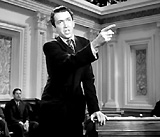
|
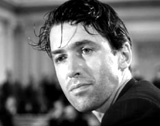
|
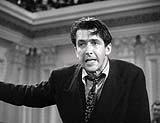
|
- Smith preached to the Senate and offered home-spun
insight on democratic ideals: "I wouldn't give you two cents
for all your fancy rules if, behind them, they didn't have a little
bit of plain, ordinary, everyday kindness and a - a little lookin'
out for the other fella, too...And I hate to stand here and try
your patience like this, but EITHER I'M DEAD RIGHT OR I'M CRAZY"
- after almost 24 hours, Smith exhorted the Senate:
"Get up there with that lady, that's up on top of this Capitol
Dome. That lady that stands for Liberty. Take a look at this country
through her eyes if you really want to see somethin'. And you won't
just see scenery. You'll see the whole parade of what man's carved
out for himself after centuries of fighting. And fighting for something
better than just jungle law. Fighting so as he can stand on his own
two feet free and decent, like he was created no matter what his race,
color, or creed. That's what you'd see. There's no place out there
for graft or greed or lies! ...this country is bigger than the Taylors
or you or me or anything else. Great principles don't get lost once
they come to light. They're right here. You just have to see them again"
- thousands of "Taylor-made" phony telegrams
from constituents in his state were manufactured (at the direction
of Taylor), and deposited in front of the Senate chamber; Senator
Paine held up a fistful, telling Smith that they all demanded that
he yield the floor and give up his filibuster: "The people's
answer to Jefferson Smith"
- Smith grabbed two fist fulls of
the phony documents, and in a hoarse voice toward Senator Paine,
he delivered an impassioned speech about "lost causes"
- accusing Paine face-to-face of betraying his ideals this time around:
("I guess this is just another lost cause, Mr. Paine. All you
people don't know about lost causes. Mr. Paine does. He said once they
were the only causes worth fighting for. And he fought for them once,
for the only reason that any man ever fights for them. Because of just
one plain simple rule: 'Love thy neighbor'")
- Smith spoke one more time directly to Paine about
lost causes: ("You
think I'm licked. You all think I'm licked. Well, I'm not licked,
and I'm gonna stay right here and fight for this lost cause even
if this room gets filled with lies like these, and the Taylors
and all their armies come marching into this place. Somebody'll
listen to me. Some...") - and then Smith collapsed onto the
floor
- in the conclusion, conscience-stricken and remorseful
Senator Paine re-entered the Senate floor and admitted that everything
Smith said was true - exonerating and vindicating him and the American
political system: ("Every
word that boy said is the truth! Every word about Taylor and me
and graft and the rotten political corruption of our state. Every
word of it is true. I'm not fit for office! I'm not fit for any
place of honor or trust. Expel me!") - resulting
in a mad eruption of support on the floor of the Senate and in the
gallery
|
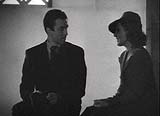
Late Night Visit with Saunders to the Lincoln Memorial
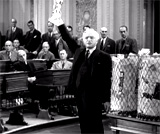
Paine Challenged Smith with 50,000 Telegrams
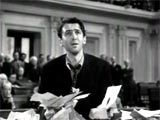
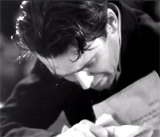
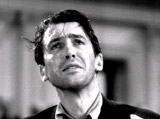
Smith Aghast at Phony Telegrams Sent to Senate Chamber
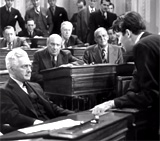
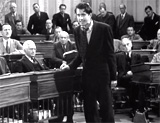
Smith's Final "Lost Causes" and "You Think
I'm Licked" Speeches
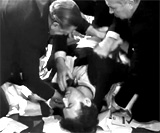
Smith Collapsing Onto the Senate Floor

Senator Paine's Admission of Dishonesty
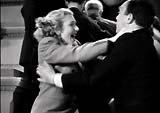
The Senate Floor and Gallery Erupting With Joy
|
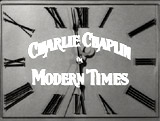
|
Modern Times (1936)
- the final unforgettable image of
the Tramp (Charlie Chaplin) arm in arm with the homeless Gamin (Paulette
Goddard) silhouetted together and walking into the sunrise to face
a new day, at the film's conclusion
|
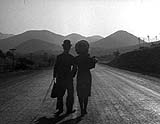
Walking Into the Sunrise Together
|
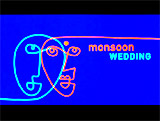
|
Monsoon Wedding (2001, India/US/Fr./It.)
 #74
#74
- the film's title referred to a series of romantic
problems and issues that emerged during a traditional and expensive
upper-caste Punjabi Hindu wedding in New Delhi, India - an arranged
marriage between daughter Aditi Verma (Vasundhara Das) and her unknown
selected bridegroom Hemant Rai (Parvin Dabas) from Houston, TX; at
the time, Aditi was in an on-again-off-again relationship with her
married ex-lover Vikram Mehta (Sameer Arya)
- Adita's unmarried cousin Ria Verma (Shefali
Shah) made the angry and malignant revelation that her uncle - the
Verma's family friend and brother-in-law Tej Puri (Rajat Kapoor),
who was living in the US but was attending the wedding, had sexually
molested her as a girl; there was the realization that he was repeating
the same offenses that she had suffered by grooming his 10 year-old
cousin Aliya Verma (Kemaya Kidwai): ("It
wasn't enough that he touched me when I was a girl. That wasn't enough
that you had to teach Aliya how older people kiss?...What did you
get out of it? I didn't even have breasts, you sick man!...Seven
afternoons. Seven afternoons of how older people kiss. You took my
clothes off. Open your mouth, Ria...And now he's doing it all over
again to Aliya!"),
an example of generational sexual abuse
- Ria caught Tej driving away
with Aliya and she threatened him to let Aliya go: ("You let her
go, from you, you bastard");
she stated that if she wasn't believed that she would leave the
festivities: ("I'm
not a part of this. I'm not a part of you...You know it. You know
I don't lie"), yet some of her family members at the wedding
doubted her: ("Insolent, crazy girl...Unmarried girls like Ria,
they make up all these fantasies")
- Ria's uncle and adoptive father (and stressed-out,
overbearing father of the bride in the wedding) Lalit Verma (Naseeruddin
Shah) sobbed and tearfully realized in bed with his wife Pimmi (Lillete
Dubey): ("I'm falling, Pimmi, hold me") that Ria was not
lying - and that he must break with tradition by confronting Tej
and telling him and his wife (Lalit's sister) to never return again
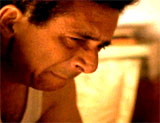
|

|
|
Lalit's Realization With His Wife Pimmi That Ria Was
Not Lying About Tej
|
- the confrontational scene in which Lalit told Tej
to leave, although Tej's wife protested that Tej was part of the family: "For
such a small thing,"
but Lalit affirmatively insisted

The Confrontation Scene: Lalit Told Tej to Leave the
Wedding
|
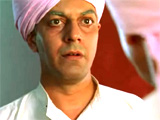
Tej Told to Leave
|
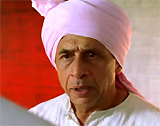
Lalit Demanding Tej's Departure
|
|
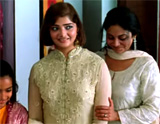
Bride-to-Be Adita (Vasundhara Das)
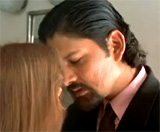
Adita With Old Flame Vikram Mehta
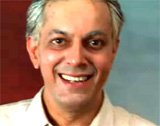
Ria's Uncle Tej Puri (Rajat Kapoor)
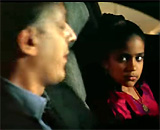
Tej Grooming and Driving Away With 10 Year-Old Aliya
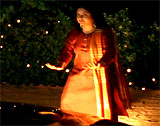

Ria Stopping Tej From Driving Away with Aliya
|
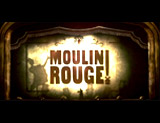
|
Moulin Rouge! (2001, US/Australia)
 #47
#47
- the sad ending in which the Moulin Rouge's star and
beautiful courtesan Satine (Nicole Kidman) was wheezing and then
died of tuberculosis in the arms of penniless writer/lover Christian
(Ewan McGregor), causing him to sob uncontrollably; she spoke final
words to him: (Satine: "I'm
sorry, Christian. I'm, I'm dying." Christian: "Shh. Shh.
It's all right." Satine: "I'm so sorry." Christian: "No,
you'll be all right. You'll be all right. l know you'll be all right.
Satine: "I'm cold. I'm cold. Hold me. I love you. You've got to go
on, Christian." Christian:
"I can't go on without you." Satine: "You've got so
much to give. Tell, tell our story, Christian. Yes. Promise me. Promise
me. Yes. That way, I'll, I'll always be with you")
|

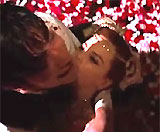
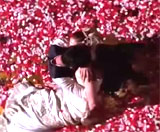
The Death Scene of Satine In the Arms of Christian
|

|
My Dog Skip (2000)
- in a story told in flashback, the touching relationship
in 1940's Yazoo, Mississippi between frail, young 9 year-old boy
Willie (Frankie Muniz), an only child, and his faithful Jack Russell
terrier Skip (played by Frasier TV
sitcom dog Moose) given to him on his birthday
- the scene in which Willie's older best friend and
ex-star high school athlete Dink Jenkins (Luke Wilson) returned home
after fighting in WWII - now a broken man who never left his home:
("It ain't the dying that's scary, boy. It's the killing")
- shell-shocked and a drunkard, he had been dishonorably discharged
from the Army, presumably for desertion
- the
baseball game scene in which Willie unexpectedly slapped an enthusiastic
Skip (wagging his tail) across his muzzle, for running onto the baseball
field to comfort him and cheer him up, when he was embarrassed by
his poor performance (and thought he had lost the game for the team)
- Willie's weeping during a visit to the veterinary
office after Skip was seriously injured and near death after being
hit by a moonshiner's spade, and Willie's pledge of friendship and
love for his dog: ("Please don't die, boy.
What would I do without you? You taught me how to play football.
You helped me meet the guys and get up enough nerve to talk
to Rivers. And understand about Dink. I'll never have another friend
like you. Ever")
- miraculously, Skip awakened
and licked Willie's hand ("You're all right!
That's my boy. I love you, Skip. I knew you'd make it. I almost
lost old Skip that day. Even as he was sleepin' on the operating
table he was still teachin' me. That day, l became a young man")
- Skip's sad death from
old age, while sleeping in Willie's old bedroom (in his parents' home)
while Skip was overseas; Skip was then buried under an elm tree
- Willie
remembered his favorite companion with the film's final tear-evoking
voice-over, speaking about Skip's death at age 11: ("In remembering
moments such as these, l retain the sad, sweet reflection of being
an only child and having a loyal and lovin' dog. For the struggles
of my life, of the dangers, toils and snares of my childhood hymns,
loyalty and love are the best things of all and surely the most lasting.
The day finally arrived for me to move away from home. I was awarded
a scholarship to attend Oxford University in England. A long way from
Yazoo, Mississippi, and a long way from my family and friends. The
dog of your boyhood teaches you a great deal about friendship and love
and death. I was an only child. He was an only dog. Old Skip was 11
- and feeble with arthritis, but he never lost that old devilish look
in his eye. He made my room his own. Came across an old photo of him
not long ago. His little face with the long snout sniffin' at somethin'
in the air. His tail was straight out and pointin', eyes were flashin'
in some momentary excitement. He always loved to be rubbed on the back
of his neck. And when I did it, he'd yawn, and he'd stretch, reach
out to me with his paws as if he was trying to embrace me. I received
a transatlantic call one day. 'Skip died,' Daddy
said. He and my mama wrapped him in my baseball jacket. They buried
him out under our elm tree, they said. That wasn't totally true,
for he really lay buried in my heart")
- the film's final title card stated: "He thought of Skip every day"
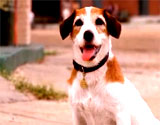
|

|
 |
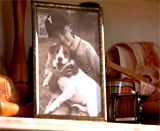
|

|

|
|
Concluding Voice-Over Remembrances of Skip
|
|
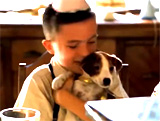
9 Year-Old Willie's Birthday Gift - Skip

Willie with Dog Skip

Dink Jenkins - A Broken War Vet
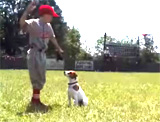
Willie Unexpectedly Viciously Slapping Skip During Ball Game


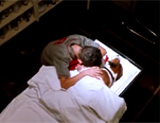
Willie Weeping in Vet's Office

Skip Kissing Willie As He Boarded Bus -
To Attend School in England
|

|
My Favorite Year (1982)
- the sad scene in which drunken,
washed-up and has-been swashbuckling movie star Alan Swann (Peter
O'Toole), hidden sheepishly in his limo, watched his estranged young
daughter Tess (Cady McClain) ride her bicycle in Connecticut - and
then after Swann had driven away, his daughter rode back to the spot
where his car had been parked and looked on, knowing he'd been watching
her
- the sentimental ending after
Alan Swann (dressed as a swashbuckling musketeer) entered the stage
on live TV before an audience - his last great moment - as young
variety show comic writer Benjy Stone (Mark-Linn Baker) looked on
and narrated about Swann's role from the control booth: ("The
way you see him here, like this. This is the way I like to remember
him. I think if you had asked Alan Swann what was the single most
gratifying moment in his life, he might have said this one right
here")

Alan On Live TV Broadcast - His Last Great Moment
|
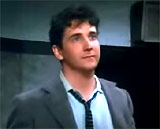
Benjy's Praise of Swann
|
- in the epilogue, Benjy continued his narration, about
how a newly-confident Swann visited his daughter Tess the next day
in Connecticut for a heartfelt reunion: ("The next day, I drove up
to Connecticut with him and Alfi (Tony DiBenedetto). This time, he
knocked on the door, and when he and Tess saw each other, it was
like they'd never been apart. Like Alfi says: 'With Swann, you forgive
a lot, you know?' I know")
|
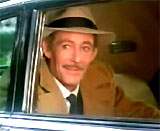
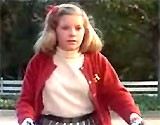
Alan Watching From Limo As His Daughter Tess Rode Her Bicycle
|

|
My Girl (1991)
 #10
#10
- the touching, poignant first
kiss between pre-teens: precocious 11 year old hypochondriac Vada
Sultenfuss (Anna Chlumsky) and allergy-ridden, geeky Thomas J. Sennett
(Macauley Culkin) who discussed the facts of life, before coming
around to their first kiss; Vada assertively asked: "Have you
ever kissed anyone?" with his response: "Like they do on
TV?" and
then she suggested: "Maybe we should, just to see what's the
big deal"; when he said: "But I don't know how," she
proposed that they practice kissing their arms, and then close their
eyes for the real thing, on the count of three -- afterwards, she
demanded that he say something because it was "too quiet",
and being agitated, he began to recite a mangled version of the Pledge
of Allegance ("On political agents to the flag of the United
States of America...") [Note: The scene won MTV's "Best
Kiss" movie award.]
- Thomas' funeral scene after
he died from a bee sting with Vada first coming down the stairs to
listen to the minister from afar, and then her tearful, mournful
breakdown at Thomas' open coffin: ("Wanna go tree climbing,
Thomas J.? His face hurts. And where is his glasses? He can't see
without his glasses. Put his glasses on! Put on his glasses! He was
gonna be an acrobat...!"); when she was restrained, she went
running out of the ceremony
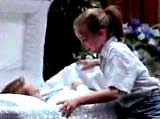
|

|
|
Vada At Thomas' Open Coffin
|
- the final scene of Vada reading
a poem to her summer writing class about a weeping willow tree -
their favorite spot: ("Weeping willow with your tears running
down. Why do you always weep and frown? Is it because he left you
one day? Is it because he could not stay? On your branches he would
swing. Do you long for the happiness that day would bring? He found
shelter in your shade. You thought his laughter would never fade.
Weeping willow, stop your tears. There is something to calm your
fears. You think death has ripped you forever apart. But I know he'll
always be in your heart")
- the film's ending with the playing of the Temptations' "My
Girl" on the soundtrack
|
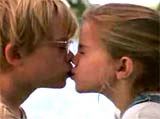
First Kiss Between Vada and Thomas

Vada Listening to Thomas' Funeral
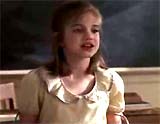
Vada's Poem About A Weeping Willow Tree
|

|
Mystic River (2003)
- in the opening flashback, when a young boy 25 years
earlier, Dave Boyle (Tim Robbins) had been abducted by two pedophiles
(who then assaulted him over a 4-day period in a cellar after driving
him away in the back seat of a black Ford sedan)
- the scene of grieving ex-con
and corner grocery-store owner Jimmy Markum (Oscar-winning Best Actor
Sean Penn) learning of the discovery of a body in the local park
- belonging to his 19 year-old daughter Katie (Emmy Rossum) and screaming
out to Massachusetts State homicide detective Sean Devine (Kevin
Bacon) as he was restrained: ("Sean, is that my
daughter in there?!")
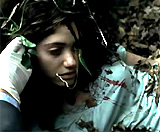
|

|
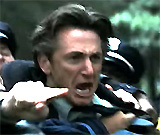
|
|
The Discovery of the Dead Body of Katie Markum and
Aggrieved Jimmy's Question to Detective/Friend Sean: "Is that my
daughter in there?"
|
- the powerfully-acted scene of Jimmy
on the back porch with neighbor-friend Dave Boyle while
struggling to grieve and let go with his tears over the hurtful,
wrenching loss of his daughter Katie: (Jimmy: "There's
one thing you could say about Katie even when she was little. That
girl was neat... And it's really starting to piss me off, Dave, because
I can't cry for her. My own little daughter, and I can't even cry for
her." Dave: "Jimmy.
You're crying now." Jimmy: "Yeah, damn. I just want to hug
her one more time. She was 19 f--king years old")
- the scene
of an emotionally-scarred Dave with his untrusting, fragile, and panicky
wife Celeste (Marcia Gay Harden) recalling his 4-day abuse when he
was a child and feeling like an undead vampire: ("Maybe one
day you wake up and you forget what it's like to be human...Dave's
dead. I don't know who came out of that cellar, but it sure as shit
wasn't Dave...It's like vampires. Once it's in you, it stays...")
- shortly afterwards, a tormented Celeste
told Jimmy that she suspected her husband as the killer - however, Dave
had only claimed that he beat up a pedophile behind McGill's bar
in the parking lot the same night that Katie died
- Jimmy suspected that the murderer was his childhood
friend - the disturbed, violated, and haunted sexual abuse victim
Dave Boyle; when confronted by Jimmy, Dave first suspiciously confessed
that he got his hand caught in a garbage disposal, using that as
the alibi for an injured and bloody hand; however, when pressed further,
he said that he had seen a suspected pedophile having sex with a
child prostitute behind the bar; he murdered the child molester,
then put the bloody body in his trunk, and dumped the body behind
the bar
- a disbelieving Jimmy forced the innocent Dave to
falsely confess and admit that he killed Katie by repeatedly demanding: "Admit
what you did, Dave, and I'll let you live" - before stabbing
him in the stomach, and finishing him off with a gunshot to the head
and throwing his body in the Mystic River - only a few hours before
the real killers were identified
- and in the next scene the following day, Sean
told Jimmy that they had found the real killers in the case; Jimmy
gave a lamenting reaction to Sean: "Thanks for finding my daughter's
killers, Sean. If only you had been a little faster" - clueing
the detective into realizing that Jimmy had killed Dave; however,
Devine didn't appear to want to press charges; Sean observed: "Sometimes
I think, I think all three of us got in that car and all of this
is just a dream, you know?...The reality is we're still 11 year old
boys locked in a cellar imagining what our lives would have been
if we'd escaped"
- Jimmy admitted his regretful mistake
to his wife Annabeth (Laura Linney): "I killed Dave. I killed
him, and I threw him in the Mystic. But I killed the wrong man. That's
what I've done. And I can't undo it"
- the scene of suspected teen
Brendan Harris (Thomas Guiry), Katie's boyfriend, who spoke poignantly
about his lost love after her death: ("I'm never gonna feel that
again. It doesn't happen twice")
|

Flashback to Young Dave Boyle's Abduction by Pedophiles
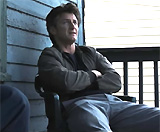
Grieving Father Jimmy on Back Porch: "I Can't Even
Cry for Her"
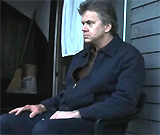
Dave on Porch with Jimmy
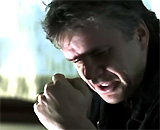
Dave Recalling His 4-Day Sexual Abuse Incident to Celeste:
"Dave's Dead"

Celeste Ratting Out Her Husband Dave to Jimmy
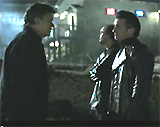
Jimmy Forcing Dave to Falsely Confess to Katie's Murder
- And Then Murdering Him
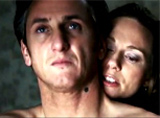
Jimmy's Regretful Remorse Expressed to Consoling Wife
Annabeth (Laura Linney)
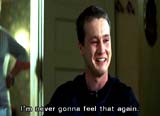
Brendan's Thoughts About Katie's Death: "I'm never gonna
feel that again"
|































































